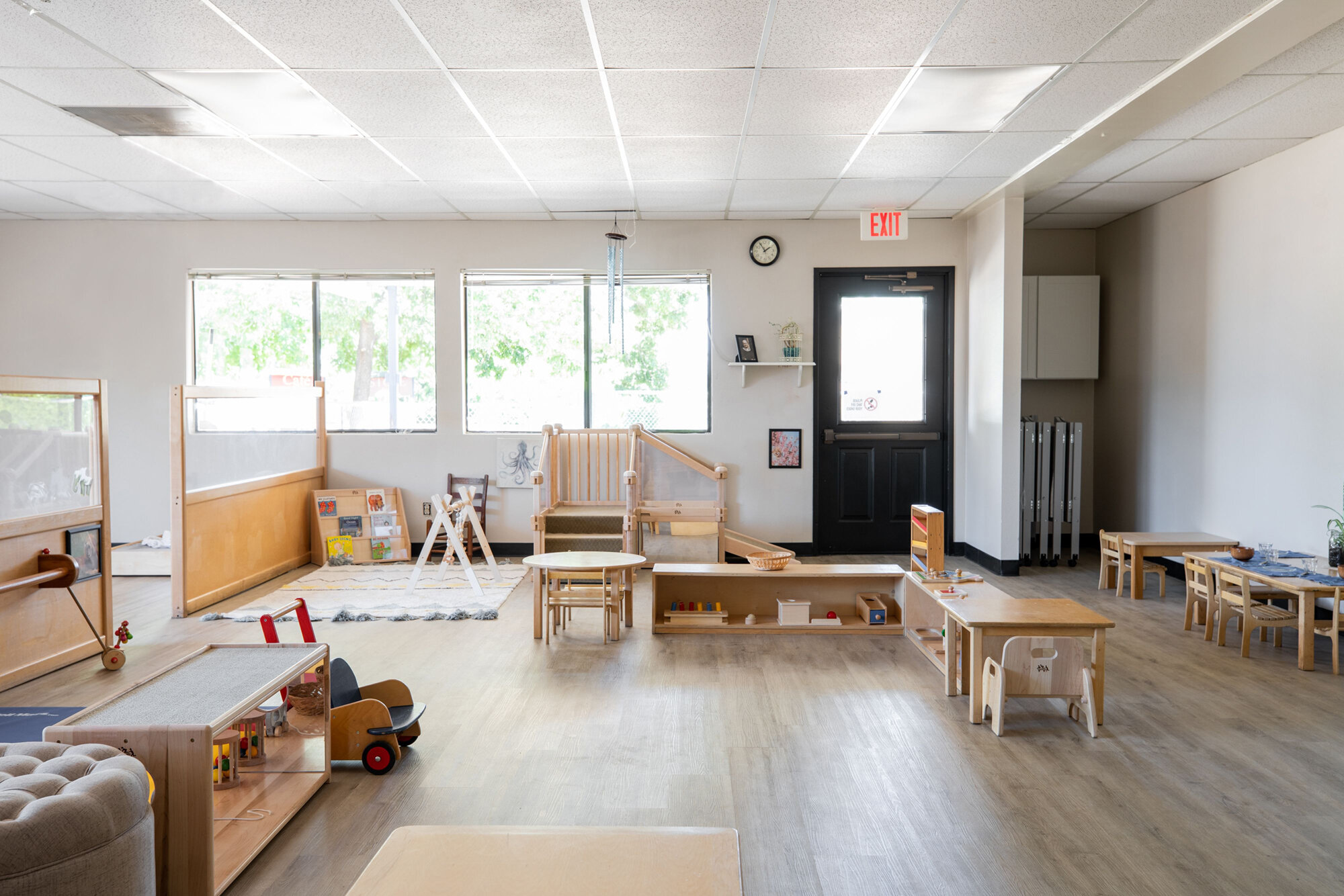Infant | Rocklin Ranch Montessori
Now Enrolling
4149 rocklin rd, rocklin
(916) 715-0255
ROCKLINRANCHMONTESSORI@gmail.com
Infant CLASSROOM OPTIONS
Option 1 | Full-Day 7:00 a.m. - 6:00 p.m
A nest for infants
Our Infant environments, embody Maria Montessori’s vision of a “Nido” or nest. They are peaceful, loving places where babies can explore and feel secure. Teachers speak in gentle tones, the daily pace is unhurried, and décor is understated and homelike. Each child in our care is an individual to be nurtured with affection and respect. As is customary for Montessori environments, every detail is selected with the child’s whole development in mind.
Each of our infant rooms welcomes children as young as 6 weeks of age. Our prepared environments have developmentally appropriate material and activities that support the child through each stage of infant growth. Because we “follow the child,” we provide a variety of environments where infants can explore based upon her curiosity and mobility, not just her age.
The age range for our infant program is from 6 weeks to 24 months. After the age of 18 months a child may begin his transition to the toddler program. Move-up ages may vary by several months depending on the individual needs of the child.
The infant environment
A child’s early years are a time of great sensitivity to bonding in order to establish trust in the world; as well as language, order, sensorial impressions, and development of coordinated movement, both fine- and gross-motor. Our Infant room supports the child’s development of movement, independence, and capacity for active exploration. Because an infant’s brain is wired for language acquisition, our environments offer rich opportunities for babies to learn through plenty of reading, singing, sign language and a running dialogue as your child’s caregivers explain the events of your child’s day. Our respect for each child shows by how we engage him in each care-giving activity with warm eye-contact and verbal explanations of each step, rather than merely just doing the tasks to the child.
In our Infant environment there are special mobiles and images to stimulate brain development, as well as a variety of tactile objects for children to explore. Because this is the period when infants learn to roll over, sit, scoot, crawl and potentially walk, the room has many opportunities for movement. There are striking differences between a Montessori Infant environment and other, more traditional daycare settings: our babies do not spend their active hours in playpens, jumpers, walkers or other containers. Instead, in our Infant rooms you will see …
Many soft floor mats and bolsters on which babies can move freely and develop gross motor skills.
Mirrors positioned close to the floor to stimulate tummy time and self-discovery.
Low bars mounted to the wall and soft furniture for children to pull themselves up.
Interesting mobiles, grasping objects, and rattles within reach.
For the older infants, where crawling and newly walking babies have their hands free for exploration, you will see…
Low shelving with materials for fine-motor development and cause/effect, such as puzzles, rings on a post, and containers to open and close.
Opportunities for purposeful water play.
A stair with low steps and a railing to practice climbing up and down.
Pull and push toys to promote gross motor movement.
All of our environments have several special features that also set them apart from typical daycare settings:
We support breastfeeding! Our Infant rooms welcome mothers who would like to nurse their baby during midday visits.
We use low tables and chairs, instead of high chairs, for snacks and solid meals. We believe this provides young children with a valuable first experience at gaining independence with self-feeding.
Ours are tranquil environments where a designated nap space ensures quality rest when babies need it.
Infant Daily Routines
Most infants follow a routine, though not necessarily a strict schedule, that allows for feeding, active time, and nap. This routine repeats itself throughout the day and provides important predictability for young children. In our Infant environments, our Montessori guides maintain a consistent rhythm outlined by parents that responds to each child’s needs and complements what parents do at home.
Ratios
Fully established Infant environments have a maximum of 12 infants and 3-4 adults, one of whom is also the Room Leader. While we strive to maintain a 4:1 ratio or less throughout the day. Once our classroom is fully enrolled, we strive to achieve at 3:1 ratio for majority of the school day. Though your child will interact with all teachers in the classroom on a daily basis, the classroom’s Head Teacher will be the main point of contact for parent communication regarding your child.
Feeding
We are your partners in guiding and supporting you during the many changes in feeding routines that you will experience as your child grows.
All bottles and food for infants are supplied from home. With fridges, freezers, and warmers in our Infant environment, we are set up to safely and hygienically accommodate both breastfed and formula-fed babies, finger foods, jarred meals, homemade purees, etc.
We provide comfortable chairs for breastfeeding mothers who would like to nurse their babies on site. Parents are also welcome to drop off expressed milk anytime during the day. In our effort to encourage independence, we offer your child the opportunity and guidance to self-feed as soon as he or she is ready.
Sleeping
Our sleep area provide each child a dedicated floor bed in a designated, peaceful area where noise is minimized and tranquility is heightened. We work with parents to replicate techniques that work best at home for your child’s sleep patterns, while sharing tips from our experts for optimizing your child’s sleep. While pacifiers are permitted when your infant enters the school, we will gently and respectfully wean your child from these in an effort to promote oral health and self-soothing. We also help prevent tooth decay by refraining from placing bottles in cribs, or having children fall asleep while drinking a bottle. We will rock or hold a newly enrolled infant who needs such comforting to fall asleep; however, we will work with these parents to help the infants develop self-regulation in sleep habits. Our goal is for your child to recognize sleep as a peaceful opportunity to self-soothe and rest because he or she is tired, just as a child will eat when hungry. If your child arrives asleep in a car seat, he or she will be gently placed on a floor bed. Children will have the opportunity to awaken from sleep naturally, rather than being awakened by an adult.
Communication
It is our priority to have close parent communication because we are all partners in caring for your child.
When your child begins in our Infant program, we will ask parents for detailed information on your baby’s sleep preferences (e.g. pacifier use), routine, feeding needs, temperament, etc. We strive to complement the home environment to ensure a sense of security and a smooth transition for your child.
On a daily basis, it is important for us to check in with parents to learn how your child slept the night before, the time of his or her last feeding, etc., so that we can best respond to his or her cues. Parents will receive the same information from us when they pick up their child at the end of each day.
We welcome parents to call and check on their children at any time, to talk informally with teachers at pick-up and drop-off time, to attend regularly scheduled parent-teacher conferences, and to book additional teacher meetings as needed.
Throughout the year, we also encourage you to attend our parent education events to learn more about child development and the Montessori approach to responding to your child’s needs. Our goal is to aid your child’s development by providing you with clear and helpful information as you journey through the infant years.
We look forward to meeting you and your infant!







